Self Leadership and
The New Leadership Playbook
Blog by Andrew Bryant
Remote Work, here to stay or part of a Hybrid Model?

Remember back in 2013, when an employee (Bob) outsourced his job and was fired?
Before being fired, Bob was considered a ‘model employee’, his work was above par, his code was clean, well-written, and submitted in a timely fashion. Quarter after quarter, Bob’s performance review noted him as the best developer in the building.
In many ways, Bob was a 'man before his time'. He chose to spend one-fifth of his salary to free up his life, reduce his stress, and ensure he hit his targets. Companies in 2013 had different criteria, they liked to ‘keep an eye’ on who was doing the work, for both productivity and security reasons.
With the pandemic hitting in 2020, and most people working from home, ‘keeping an eye’ on people seems less important, and keeping employees healthy, and well-balanced with manageable stress is much more so. Security will remain a concern, but solutions have been found for that.
The Future of Remote Work is Hybrid
The future is NOW, and smart companies have alrea...
How not to be Passed Over for Promotion
Are you driving your career, or are you being a passenger?
In this post, I want to share some actions you can take to ensure you don’t have to swallow the bitter pill of disappointment when you are passed over for a job that should rightfully be yours.
Promotion Secret Sauce
Philip was furious, he had worked hard, stayed late, been loyal, exceeded his numbers, but missed out on the promotion he was expecting.
When he asked his boss the reason, he was told that the other directors felt he lacked, ‘Executive Presence’.
Philip hadn’t realized that he was missing the ‘Secret Ingredient’ to success in a modern organization, and it cost him. It cost him big time. The definition of executive presence is:
“Executive Presence is the ability to project confidence and gravitas (substance) under pressure.”
Executive Presence is about the right kind of ‘visibility’, whether the meeting is in person or on a global call. Having worked with many managers and leaders, to successfully develop the...
Getting Respect – You are doing it Wrong!

In a Harvard Business Review study of 20,000 employees, 54% claimed that they don’t get respect from their leaders. Respect has been shown to improve employee trust and safety and effect a 92% increase in focus and priority. The obvious conclusion, therefore, is to instruct managers and leaders to be more respectful, but what if this conclusion is wrong?
If you are honest with yourself, do you respect someone who does not deserve respect? Are you able to respect someone who does not respect themselves?
Respect Definition
The verb respect means to admire someone (or something) because of their abilities, qualities, or achievements. It can also mean having due regard for their feelings, wishes, or rights.
In my work on self-leadership, and through over 20 years of coaching, I can share that most people struggle to respect their own abilities, feelings, or rights. And how can you expect respect if you do not respect yourself?
Coaching for Respect - A Case Study
Recently I was coachi...


